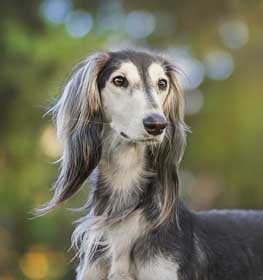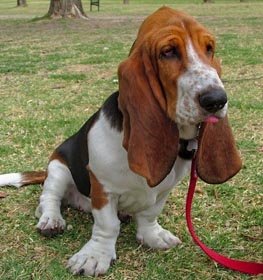Saluki Information & Dog Breed Facts
Collection of all the general dog breed info about Saluki so you can get to know the breed more.
| Group | Hunting Dogs |
|---|---|
| Popularity Rank | 123 |
| Reviews | 2 |
| User Ratings | |
|
Compare the Saluki With Other Dogs
Select at least one dog breed to make the comparsion. | |
 | |
| Origin | |
|
Common Names & Aliases
What other names is a Saluki known by? Discover all traditional, regional and informal names used for this breed. | Persian GreyhoundGazelle Hound |
|---|---|
|
Breed Classification
What type of dog breed is a Saluki? Learn about its genetic classification and breeding category. | Purebred |
|
Size Classification
What size category is a Saluki? Learn how big the Saluki breed typically grows. | Large |
|---|---|
|
Weight Statistics
How much does a Saluki weigh? Discover typical weight ranges for adult males and females of the Saluki breed. | 29 - 66 pounds (13 - 30 kg) |
|
Average Weight
What is the average weight of a Saluki? | 29 - 66 pounds (13 - 30 kg) |
|
Height
How tall is the Saluki? Saluki height: | 23 - 28 inches (58 - 71cm) |
|
Average Height
What is the average height of a Saluki? | 23 - 28 inches (58 - 71cm) |
|
Price Range
How much does a Saluki puppy cost? Find current market prices and factors affecting Saluki costs. | $600-$800 If you choose to purchase the Saluki, you should know that the mentioned amount of money is an average of the collected data from breeders’ sites and puppy finder places. If you have a Saluki for sale, please advertise it on a reliable website to make sure the Saluki gets to a happy place. |
|---|---|
|
Availability
How easy is it to get a Saluki? How many Saluki are there in the world? | Frequent: The Saluki is easier than average to get. Maybe there is some risk of overbreeding, as it is a popular breed. Due to its popularity, inbreeding may occur. A new study shows that inbreeding contributes to the incidence of disease and health problems. So be careful and seek the help of an experienced person or a professional, in making your decision. |
|
Intelligence Rating
How intelligent is a Saluki? Discover the Saluki's intelligence ranking and learning capabilities. | Average: It takes patience to teach this breed any tricks or commands, but the effort is worth it. They understand and remember new commands after an average of 25-40 repetitions.
The Saluki ranks average in the intelligence ranking of dogs. |
|---|---|
|
Training Difficulty
How easy is it to train a Saluki? Learn about the Saluki's trainability and response to training methods. | Saluki dogs are easy to train. They find out the association between commands and actions quite quickly. |
|
Watchdog Rating
How good is a Saluki as a watchdog? Learn about the Saluki's alertness and guarding instincts. | Saluki dogs are average watchdogs. If they sense something different, they will alert you, but observation isn't considered their main job.
|
|
Territorial Protection
Is a Saluki protective of its territory? Learn about the Saluki's guarding instincts and behavior. | Saluki dogs can't provide protection for their territory. It's better to leave them out of the duty of protecting your valuables and property. |
|
Personality Traits
What personality does a Saluki have? Learn about characteristic Saluki temperament and behavior traits. | AloofIntelligentLoyalQuietReserved |
|---|---|
|
Sensitivity Level
How sensitive are they? Saluki sensitivity: | Sensitive: Saluki dogs don't like an irregular daily routine, noisy household, and frequent guest visits.
This breed's emotional level reflects their owner's feelings and they don't handle punishments well. |
|
Affection Level
How affectionate are they? Is a Saluki a good family dog? | Average: Saluki dogs are average dogs regarding their affection level. Some breeds are forthcoming and friendly, while others are independent and don't bond too closely with their owners. |
|
Social Needs
How much social interaction does the Persian Greyhound need? Saluki social needs: | Saluki dogs need for social interaction is average. This breed likes being around people or other animals, but they don't mind being left alone for a few hours either. |
|
Impulse to Wander or Roam
How likely is the Saluki to run away? Does this breed explore or wander a lot? Does Saluki roam? | Saluki dogs have high wanderlust potential, which means that this breed has a strong desire for exploring the world. Safer to walk them on a leash unless you teach them how to get back to you on command. This breed is also able to cause damage to your fence. |
|
Prey Drive
Do this canine have a strong prey drive? Does Saluki have high prey drive? | Saluki dogs have a high impulse to chase and catch something. Cats or any other small animals are in danger. It's a natural instinct, doesn't necessarily mean that Saluki dogs are aggressive. Better to keep this breed on a leash. |
|
Barking Frequency
Does a Saluki bark a lot? Learn about typical Saluki vocalization patterns and triggers. | Low to Average: The Saluki rarely barks. This breed could be a good choice if you're looking for a quiet breed. They don't bark unless there is a good reason.
Top reasons for barking: protection, alarm, fear, boredom, attention-seeking, greeting, separation anxiety, compulsive barking. |
|---|---|
|
Playful Nature
How playful is a Saluki? Understand the typical play drive and energy level of the Saluki breed. | Average: Salukis, like any other dog breed, like playing. Sometimes they bark in excitement for playing, but they are not the most playful dog breed. |
|
Apartment Adaptability
Can a Saluki live in an apartment? Learn about the Saluki's suitability for apartment living. | Very house-friendly dog the Saluki breed. It's good if you have a small garden where he can go out and do his business, but it's not important at all. You can get enough exercise with one or two walks a day, so keeping them indoors shouldn't be a problem. |
|
Lifestyle Adaptability
How adaptable is a Saluki to lifestyle changes? Learn about the Saluki's flexibility to new situations. | Saluki dogs adapt very well to lifestyle changes and basically all living environments. They don't mind moving from one place to another with their owner. |
|---|---|
|
Alone Time Tolerance
Can a Saluki be left alone? Learn about the Saluki's tolerance to solitude. | Just like every puppy, they are prone to panic, cry, bark, whine when they left alone by their owner. With proper socialization and quality time with the dog can solve this problem. |
|
Bite Risk Assessment
What is a Saluki biting potential? Learn about the Saluki's bite risk factors. | Low 🔽 The Saluki has a low chance of biting somebody. Top reasons for dog bite: protection, pain, excitement, herding instinct, being provoked. (Data based on the available online bite statistics.) |
|---|---|
|
Mouthing Tendency
Is a Saluki mouthy? Learn about the Saluki's tendency to use mouth during play. | Saluki dogs have a higher than average tendency to nip, chew, playbite, or herd people. It's a common habit during puppyhood, not aggressive behavior. These "bites" don't hurt, but Saluki dogs need to be taught a good attitude. |
|
Bite Strength Rating
How strong is a Saluki bite? Learn about the Saluki's bite force measured in PSI. | Between 200 and 400 PSI ⏺ Saluki bite force: Ordinary. Bite force Saluki measurements typically fall within the range of 200 to 400 PSI. The bite force of a Saluki is considered ordinary when compared to other dog breeds, but it is still quite powerful. This Saluki bite force PSI can cause bite wounds. Saluki bite PSI is not something that should be feared if the dog is well-trained and managed. To avoid any issues, it's essential to learn how to train a Saluki puppy not to bite from an early age.
The Saluki, and many others, have a fearsome presence because they have significant jaw strength, so it is important not to anger the dog and have it around strangers until it is fully trained. However, they are usually quite calm and good companions, they work well in families and are easy to care for. In conclusion, while the Saluki bite force is certainly an interesting aspect of the breed, it is important not to let it overshadow the many other reasons why these dogs are so loved and respected. With proper training and socialization, a Saluki can be a loyal and protective companion for your family. |
|
Average Lifespan
How long does a Saluki live? Learn about the typical lifespan of the Saluki breed. | 12-14 years The average lifespan of Saluki: 13 years |
|---|---|
|
Climate Tolerance
How well does a Saluki handle different weather? Learn about the Saluki's climate adaptability. | Prefers average to warm weather conditions Different dogs have different preferences when it comes to weather conditions. However, in general, most dogs prefer average to warm weather conditions, as they typically find hot weather conditions to be uncomfortable and taxing. |
|
Health Concerns
What health issues are common in a Saluki? Discover typical conditions affecting the Saluki breed. | The Saluki is a healthy breed, but there are certain health issues that you should check with your vet regularly. |
|
Vet Care Frequency
How often does a Saluki need vet visits? Learn about the Saluki's veterinary care requirements. | Average The Saluki should have a complete physical check-up at least once per year. If your dog shows any symptoms, call your veterinarian. |
|
Energy Rating
How energetic is a Saluki? Understand daily activity needs of the Saluki breed. | Saluki dogs are high-energy dogs. An active lifestyle makes them happy. |
|---|---|
|
Activity Requirement / Exercise Need
How much exercise does a Saluki need? How much exercise do Saluki dogs require per day?
Do Saluki dogs need a lot of exercises? | Saluki dogs have an average exercise need. This breed is satisfied with short walks every weekday and a long ones on weekends. |
|
Sleeping Need
How much sleep does the Saluki breed need? | Saluki dogs don't need too much sleep. They are energetic and desire to live active life. If you think naps are overrated, this breed can be the best choice for you. |
|
Obesity Tendency
Is a Saluki prone to weight gain? Learn about the Saluki's obesity risks. | Low: The Saluki has good luck with genetics. This breed doesn't need to worry about obesity. To make your dog happy and fit, feed him with quality dry dog food and live an active life together. Try to find the happy medium between exercise and feeding.
If you notice any weight gain, consult your veterinarian and make a diet plan. Reduce unhealthy food and snacks, and measure the Saluki weight regularly. |
|---|---|
|
Food Consumption
How much food does a Saluki need daily? Learn about the Saluki's feeding requirements. | 1.5 to 2.5 cups of high-quality dry food a day, divided into two meals. |
|
Allergy Friendliness
Is a Saluki hypoallergenic? Learn about the Saluki's suitability for allergy sufferers. | No Saluki dogs don't do well with allergy sufferers by causing allergic reactions. Some dog breeds are even considered to higher possibility of an allergic response. Coat type isn't necessarily relevant, because most people are allergic to dander (flakes on the dog's skin) or saliva, not actually to dog hair. |
|---|---|
|
Coat Colors
What colors does a Saluki come in? Discover all possible Saluki color variations. | BlackTan Red Cream White SilverFawn Golden Chocolate |
|
Grooming Requirements
How much grooming does a Saluki need? Learn about Saluki coat maintenance requirements. | Effortless: The Saluki requires minimal grooming. Seasonal flea treatment is needed, but cutting the dog's hair by a professional groomer isn't necessary. Ears and eyes should be cleaned sometimes to avoid infections. Saluki is one of the best choices if you don't have the time, skill, or money to take care of a high-maintenance dog. Highly recommended for beginners. |
|
Drooling Tendency
Does a Saluki drool a lot? Learn about the Saluki's drooling habits. | The Saluki is a perfect example of a very low drooling tendency. If you're disgusted by slobber spots on your clothes, the Saluki could be a perfect choice for you. Drooling is the unintentional saliva flowing outside of the mouth. It can be completely normal or a sign of a health problem. Certain dog breeds drool minimum compared to others, just like the Saluki.
If you notice any change in your dog's drooling habit, you should contact a vet as soon as possible. |
|
Stinkiness Rating
Does a Saluki smell bad? Learn about the Saluki's natural odor levels. | Low 🔽 The Saluki has a low chance of bad smell. Top reasons for dog stinkiness: infection of bad tooth/ear/skin folds, gas attacks. |
|
Coat Characteristics
What type of coat does a Saluki have? Learn about the Saluki's fur characteristics. | Smooth |
|
Bathing Needs
How often does a Saluki need baths? Learn about the Saluki's bathing requirements. | 4-6 weeks Average. Experts recommended at least every 4-6 weeks for this family pup. According to a study, 56% of pet parents don’t bathe their dogs as frequently as they should, and 60% use the sniff test when deciding when it’s bath time.
Bathing your dog is beneficial to them in more ways than just one. It’s also a good time to look for unusual scratches, bumps, fleas, and other irregularities. When their hair is wet and flat against their body, these details are more visible. |
|
Shedding Level
How much do Saluki dogs shed? How to control, reduce and prevent the shedding of the Persian Greyhound? Do Saluki dogs shed a lot? | Saluki dogs shed none to minimal. Having a puppy from this breed you don't have to be afraid of your couch or car being covered by dog hair. Saluki dogs could be the best choice if you don't tolerate dog hair. |
|
Child Compatibility
Is a Saluki good with children? Learn about the Saluki's behavior around kids of different ages. | Saluki dogs are kid-friendly dogs. This breed is a good choice if you have children. |
|---|---|
|
Pet Compatibility
How well does a Saluki get along with other pets? Discover the Saluki's compatibility with other animals. | Saluki dogs usually don’t get on well with other pets. |
|
Stranger Friendly
Are they aggressive or friendly towards/with strangers? Saluki temperament with other people: | Saluki dogs are average friendly towards strangers. |
|
Cat Friendly
How well do Saluki dogs get along with cats? Are they good with kittens? What is this fido's temperament with cats? Can they be good with cats? Can the Saluki breed live with a cat? | Saluki dogs are not the most cat-friendly dogs. |
|
Dog Friendly
Is Saluki good with other dogs? Are they dog-friendly dogs? How well do Saluki dogs get along with other dogs? | Saluki dogs are average friendly towards other dogs. |
|
Good For First Time Owners
Is Saluki breed good for first-time owners? Do they make a good dog for novice owners? Is Saluki breed suitable for first-time owners? | Yes Saluki dogs are good for novice owners, due to their easy-going personality. |
|
Office Friendly
Are Saluki dogs good office canines? Do Saluki dogs make good office-friendly pets? Can they be office dogs? | No Saluki is not the best dog breed for office environment. |
|
Senior Citizens Friendly
Are they senior citizens friendly dogs? How well do Saluki dogs get along with the elderly people? What is the Persian Greyhound temperament with senior people? Are Saluki dogs good for elderly owners? | Salukis are usually recommended for elderly people. |
|
Service Dog Capability
Can a Saluki be a service dog? Learn about the Saluki's service work potential. | Not really This breed generally not used as a service dog. A service dog is a term used in the USA to refer to any type of assistance dog specifically trained to help people who have disabilities, such as visual impairment, hearing impairments, mental disorders, seizures, mobility impairment, and diabetes. Service dogs are protected under the ADA (Americans with Disabilities Act).
Saluki is not the best breed for service purposes. |
|---|---|
|
Therapy Work Suitability
Is a Saluki good as a therapy dog? Learn about the Saluki's therapy work aptitude. | Not really This breed is generally not used as a therapy dog. A therapy dog is a dog that might be trained to provide affection, comfort, and love to people in hospitals, retirement homes, nursing homes, schools, hospices, disaster areas, and people with anxiety disorders or autism.
Saluki is not the best breed for therapeutic purposes. |
|
Scent Detection Ability
Is a Saluki good at detection work? Learn about the Saluki's scenting abilities. | Not really They are not typically employed for this type of work, but there may be exceptional cases. A detection dog or sniffer dog is a dog that is trained to use its senses (mostly its smell) to detect substances such as explosives, illegal drugs, wildlife scat, currency, blood, and contraband electronics such as illicit mobile phones.
Saluki is not the best breed for detection purposes. |
|
Search & Rescue Potential
Can a Saluki do search and rescue? Learn about the Saluki's SAR capabilities. | Not really This dog breed is not typically used as a search and rescue dog. The use of dogs in search and rescue (SAR) is a valuable component in wilderness tracking, natural disasters, mass casualty events, and locating missing people.
The Saluki is not the best breed for SAR purposes. |
|
Maritime Work Ability
Is a Saluki good on boats? Learn about the Saluki's maritime capabilities. | Not really Saluki breed usually doesn't like being on a boat. Boat dogs were typically bred for their strength, stamina, and water resistance, as they were often required to perform tasks such as pulling in fishing nets, and jumping into the water to retrieve ropes or lines, or helping to move cargo. Sailor dog is a type of dog that was bred to accompany sailors on their voyages. They were typically used for three purposes: as a working dog, a watchdog, and as a companion. A boat dog is a term used to describe a type of dog that was traditionally bred and used as a working dog on boats. |
|
Draft Work Capability
Can a Saluki pull carts? Learn about the Saluki's drafting abilities. | Not really A drafting dog or draft dog is a dog bred and used for cart pulling. Dogs bred for this work have strong builds and qualities that are needed, strength and determination.
Saluki is not the best breed for drafting purposes. |
|
Military Service Background
Was a Saluki used in military service? Learn about the Saluki's military history. | Not really In history, this breed was not really used for combat dog. |
|
Puppy Litter Size
How many puppies does a Saluki usually have? Learn about typical litter sizes. | 4-8 puppies |
|---|---|
|
Pregnancy Duration
How long is a Saluki pregnant? Learn about the Saluki's gestation period. | 60-64 days Reproductive cycle of the female Saluki: The first period called Proestrus lasts for about 9 days.
During this time the females start to attract males. You can notice by swelling vulva and bloody discharge. The second part is the Estrus when the female is receptive for the male. It lasts for about 3 to 11 days. The sign of the proestrus part is the soft and enlarged vulva. The discharge decreases and lightens in color. The third part is the Diestrus. Normally, it occurs around day 14. In this period the female’s discharge changes for vivid red and coming to its end. The vulva returns to average, and she will no longer permit mating. The fourth part called the Anestrus. The time frame between heat periods normally lasts about six months. |
|
Breeding Frequency
How often can a Saluki have puppies? Learn about safe breeding intervals. | Once a year. More frequent breeding is not healthy. It is very important not to buy a dog from a puppy mill, where the needs of the pups and their mothers are ignored. It's an inhumane high-volume dog breeding facility, where puppies born several times a year. |
|
AKC Classification
What AKC group is a Saluki in? Learn about the Saluki's AKC classification. | Recognized by the American Kennel Club in 1929 as a Hound breed. |
|---|---|
|
FCI Classification
What FCI group is a Saluki in? Learn about the Saluki's international classification. | Recognized by FCI in the Sighthounds group, in the Long-haired or fringed Sighthounds section. |
Saluki Pros and Cons
- Training Difficulty: Saluki dogs are easy to train.
- Apartment Adaptability: Very house-friendly dog the Saluki breed.
- Grooming Requirements: Effortless: The Saluki requires minimal grooming.
- Shedding Level: Saluki dogs shed none to minimal.
- Drooling Tendency: The Saluki is a perfect example of a very low drooling tendency.
- Stinkiness Rating: The Saluki has a low chance of bad smell.
- Obesity Tendency: Low: The Saluki has good luck with genetics.
- Lifestyle Adaptability: Saluki dogs adapt very well to lifestyle changes and basically all living environments.
- Child Compatibility: Saluki dogs are kid-friendly dogs.
- Senior Citizens Friendly: Salukis are usually recommended for elderly people.
- Good For First Time Owners: Saluki dogs are good for novice owners, due to their easy-going personality.
- Allergy Friendliness: Saluki dogs don't do well with allergy sufferers by causing allergic reactions.
- Mouthing Tendency: Saluki dogs have a higher than average tendency to nip, chew, playbite, or herd people.
- Impulse to Wander or Roam: Saluki dogs have high wanderlust potential, which means that this breed has a strong desire for exploring the world.
- Cat Friendly: Saluki dogs are not the most cat-friendly dogs.
- Office Friendly: Saluki is not the best dog breed for office environment.
Saluki History
The Saluki, in the past also known as the Persian Greyhound or the Gazelle hound, is considered to be one of the most ancient of breeds and also the oldest purebred in the world. According to experts recent genetic evidence confirms this to be the case as well. Scientists calculated that the Salukis and other ancient breeds descend from the first dogs and made their way through the world with their nomadic owners. Descriptions of dogs who looked like Saluskis, with a Greyhound-like body and feathering on the ears, tail, and legs, appeared on Egyptian tombs dating back to 2100 B.C. over 4000 years ago. Evidence was also recovered from the Sumerian Empire 7000 B.C., cravings of dogs identical to the modern Saluki. Moreover, even more, evidence was found in Egypt, that Pharaohs hunted with Salukis partnered with falcons, the same exact hound appearing on the Egyptian tombs of 2100 B.C. The dogs were often mummified after death as they were honored. The remains of dogs have been found in the tombs of the upper Nile.
Some cynologists believe that there are Biblical references to the breed, and some interpret that the Koran has described them as sacred gifts from Allah. People confirmed that it is true that Salukis were regarded as “clean” by Muslims for centuries. They were allowed to touch them and let the dogs live in their homes, including women’s quarters. Tradition held that one never sold a Saluki, but the breed was only gifted to very special persons in exchange for wives, horses, or camels. Some people believe that the breed may take its name from the ancient city of Saluk, in Yemen, others believe that the name is the translation of the Arabic word for the hound.
Salukis were very widespread in the Middle East and could be found in Persia, Syria, Palestine, Anatolia, Mesopotamia, and Arabia. Nomadic people and the tribes that developed this breed took their Salukis with them from the Sahara to the Caspian Sea. Local weather and terrain led to several natural variations in the breed’s coat, size, and type so Salukis that was eventually imported to Europe came from many different old original types. The first documented case of the breed arriving in Britain was in 1840, but it wasn’t until after World War I when many British officers returned with dogs from the Middle East that the breed became established in Great Britain. At the time they were known as Persian Greyhound, though some circles called them Gazelle Hound. The breed especially got more notice when Lady Florence Amherst imported a pair of Arabian Salukis from the kennels of Prince Abdulla in Transjordania to Norfolk, England in 1895. The same year that the Kennel Club of England recognized the Saluki and adopted the first breed standard, the Saluki/Gazelle Hound Club of England was formed, in 1923. Interest in the breed was slower to take hold in the United States. Four years later the Saluki Club of America was formed, and the American Kennel Club officially recognized the breed as a member of the Hound Group. The first Saluki registered by the AKC was Jinniyat of Gerevel in 1929. Today the Saluki is a rare treasure ranking 116th among the 155 breeds recognized by the AKC. Overall they are excellent dogs, they rely on their eyesight, rather than their noses, to find the prey, and then they use their speed for the chase and capture. However, because they are too fast for humans to keep up with, they work alone which has given them an independent personality.
Latest Saluki Compares
Saluki Names
How old is my Saluki in human years?
You May Also Like
Rate The Saluki Breed
Saluki Comments, Reviews and Questions
- Aida
Jun 6, 2024, 3:27:51 PM:
It's the best dog breed
- Saluki
Sep 13, 2019, 1:25:17 AM:
I. LOVE SALUKIS




